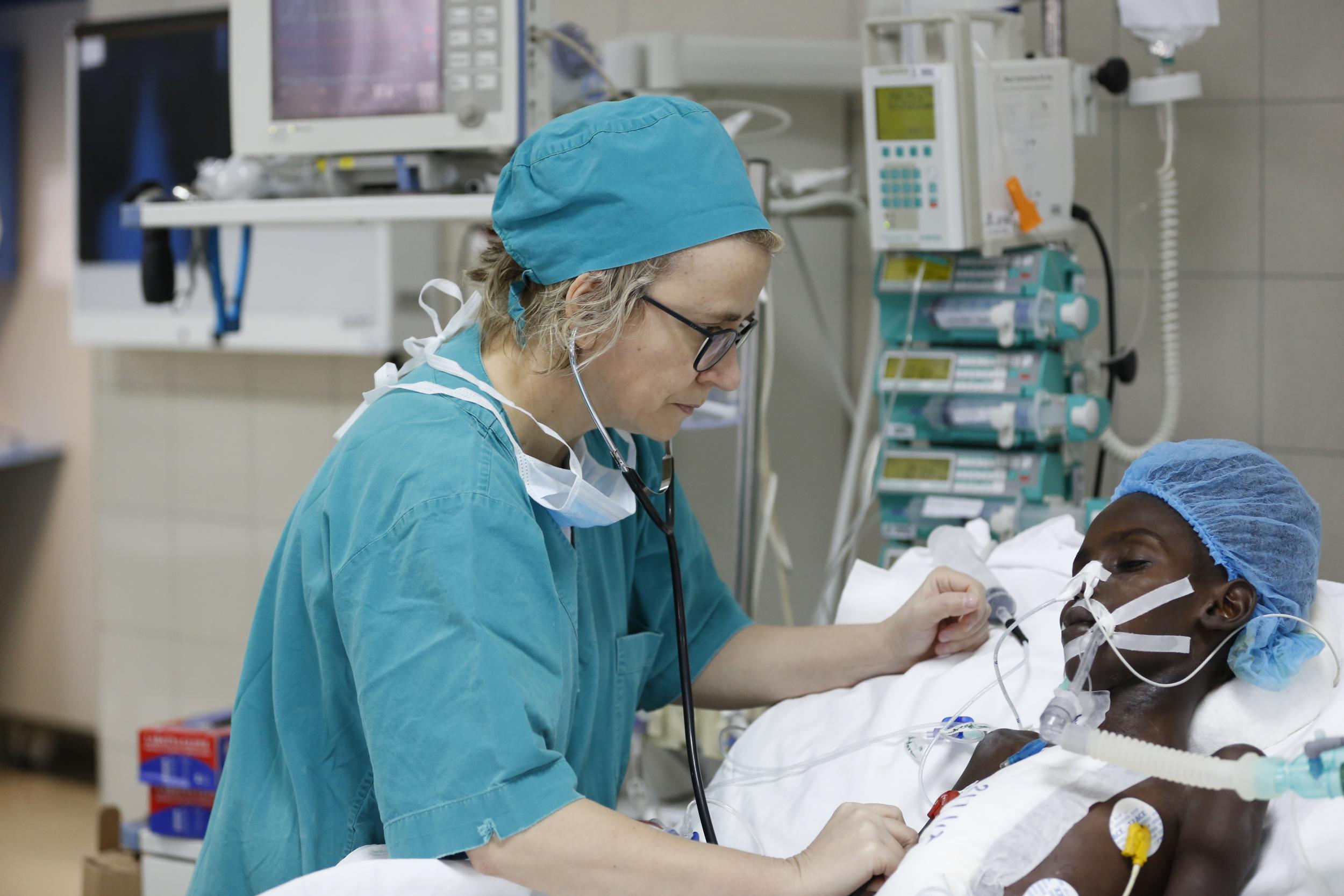Coronavirus: The team of Ebola medics fighting Covid-19 at the centre of Italy’s outbreak
Dr Gina Portella has worked in Afghanistan, Sudan and Sierra Leone. She tells Federica Marsi the first step to fighting a contagion is learning how to help others ‘without feeling constantly under threat’

If the fight against coronavirus is a war, Gina Portella of all people knows what one looks like. After 15 years between Afghanistan, Sudan and Sierra Leone – a country ravaged by an outbreak of Ebola – the anaesthesiologist-intensive care specialist is about to enter a new battlefield, this time on home turf.
Italy is where the world’s deadliest coronavirus outbreak has hit the hardest. On Sunday, the death toll stood at 15,362 – more than in China and the US combined – but the real number may be four times higher. In Bergamo, a province of about a million people in the region of Lombardy, the sheer number of patients succumbing to the coronavirus is overwhelming every hospital.
The challenge humbles even a war-hardened medical professional like Dr Portella. “I tell myself to go slow because working here will be tough,” she tells The Independent.
Dr Portella is part of a team called to apply their expertise fighting Ebola to the management of a new field hospital set up at Bergamo’s exhibition centre. As Covid-19 drives an entire sanitary system into uncharted territory, those who have been on the frontline against the Ebola outbreak are now torchbearers at home.
Her experience in West Africa underscores the thorny medical issues and the personal frustrations that the containment of coronavirus entails. “When the Ebola outbreak started, we first had to learn how to assist our patients with peace of mind, without feeling constantly under threat,” the anaesthetist said.
Emergency, the Italian medical NGO she works for, was operating a surgical centre in Sierra Leone when the virus hit in 2014, forcing the team to upend all procedures. “We realised we had to compartmentalise,” she said. They reorganised the centre into distinct areas, and made sure they knew what was happening in each.
The organisation also started adopting heavy personal protection equipment (PPE), which left medical personnel at the end of the day with “boots filled with sweat up to our ankles”.
Under Emergency’s guidance, Bergamo’s hospital was set up to look like a maze. Arrows guide medical personnel through the stages of PPE preparation before leading to its bleak heart, where positive patients are attached to respirators or strapped to helmets similar to those of astronauts.
When the facility opens its doors on Monday, taking in the first 35 patients and progressively scaling up to fill 140 beds, each door to and from the intensive care units will be manned by personnel tasked with checking that missteps as simple as touching a surface do not result in contagion.
According to Dr Portella, Covid-19 is stealthier than Ebola. “In Sierra Leone, we knew that a fever meant the patient was contagious,” she said. With the new coronavirus – which can be spread by asymptomatic carriers – this reference point has been lost.
Ebola’s haemorrhagic fever transmitted through contact with bodily fluids, resulting on average in the death of one in two patients – a fatality rate much higher than Covid-19. But the latter has an exponentially higher rate of contagion, which has led to its fast spread across the world and ultimately a much higher death toll. While Ebola killed a total of 11,310 people in West Africa, Covid-19 topped this number over one month in Italy alone.
This, according to Dr Portella, is what makes the metaphor of the war zone pertinent. “We are of course not living under heavy shelling, but our medical personnel is living through a war-like situation,” she said.
During her missions in Afghanistan, hospital wards would be inundated on short notice by victims of a suicide attack who required immediate care. Similarly, Covid-19 has filled the intensive care units of Italy’s wealthy northern region beyond capacity and forced medical personnel to adopt a rigorous triage process, sorting people based on their need for immediate medical treatment – and their chances of survival.
“What is unprecedented here is the large numbers of patients competing for a scarce resource,” she said, a factor that forces doctors to make constant life-and-death decisions. In Bergamo, the 80 beds in the intensive care units of the city’s main hospital, Pope Giovanni XXIII, are always filled. In resource-limited circumstances, admitting a patient who will require weeks of intensive care treatment is a decision that must be carefully pondered.
The psychological stress experienced by medical personnel is compounded by the protracted nature of the emergency and by the unpredictability of the disease. “At times, there might be a patient who does not look like a priority, and the next morning he’s gone,” Dr Portella said. “This frustrates you because you feel powerless, you do not understand why that happened.”
When the emergency is over, Dr Portella hopes there will be time to reflect. “The realisation that you don’t have sufficient capacity to save people’s lives has been a tough experience,” she said. “I hope this will wake us up to the fact that there are many countries around the world where this reality is just part of everyday life.”
Join our commenting forum
Join thought-provoking conversations, follow other Independent readers and see their replies
Comments